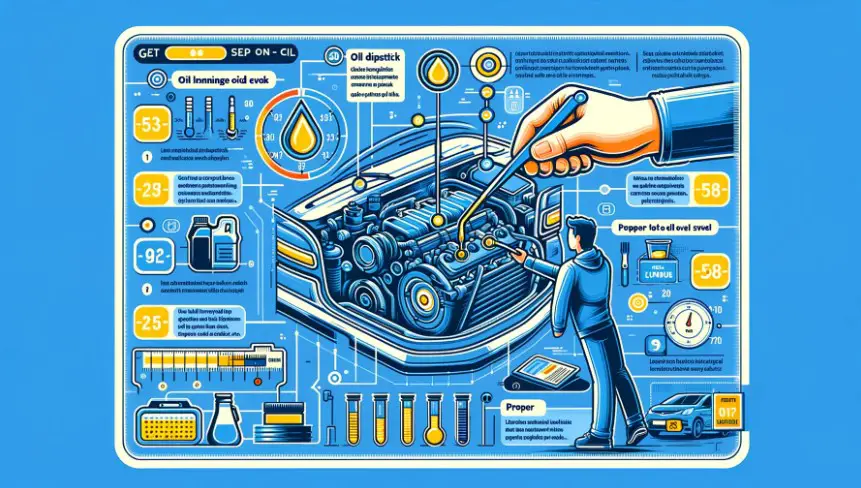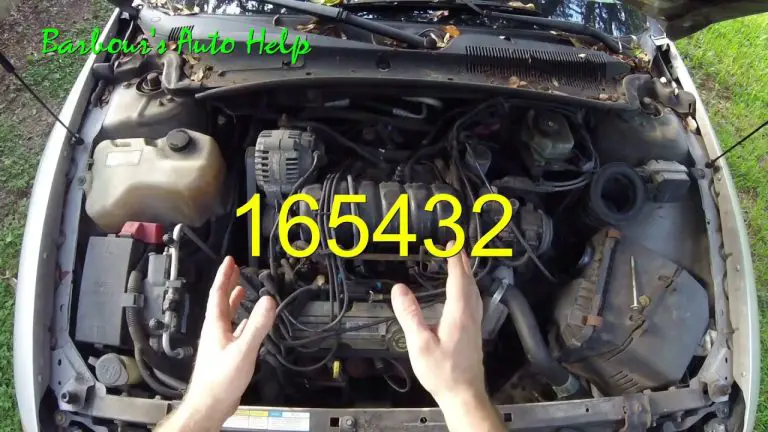Ticking Noise In Engine When Idle And Accelerating
Ticking Noise In Engine When Idle And Accelerating – it’s a sound that no car owner wants to hear, yet it’s more common than you might think. This distinct ticking, especially noticeable when your vehicle is idling or accelerating, can signal a range of issues, from the mundane to the serious. But what exactly causes this noise, and more importantly, how can you fix it?
In the article, we will cover:
- The Role of Engine Oil in Ticking Noise: How oil levels can influence engine sounds.
- Mechanical Components and Ticking Noise: Exploring the internal parts that could be at fault.
- External Factors Causing Ticking Noise: Identifying issues outside the engine that contribute to the noise.
- Diagnosing the Ticking Noise: A practical guide to finding the root cause.
- Common Fixes for Ticking Noise: Effective solutions for common ticking noise problems.
- Preventive Measures to Avoid Ticking Noise: Tips to maintain your engine and prevent future issues.
- Understanding Serious vs. Minor Ticking Noises: How to tell if the noise is a warning sign of a bigger problem.
The Role of Engine Oil in Ticking Noise
A vital factor often overlooked in the quest to silence a ticking engine is the engine oil. This lubricant plays a pivotal role in the smooth operation of your vehicle’s engine, and its inadequacy can be a primary culprit behind those unnerving ticking sounds.

How Low Oil Levels Cause Engine Ticking
Engine oil is the lifeblood of your vehicle’s engine, providing necessary lubrication to moving parts and reducing friction. When the oil level drops too low, these parts may not receive enough lubrication, leading to increased friction and, consequently, the ticking noise. This problem is especially evident during idle or acceleration when engine parts move faster and require more lubrication.
Checking and Maintaining Oil Levels
Regularly checking your engine oil level is a simple yet effective way to prevent ticking noises:
- Routine Checks: Make it a habit to check your oil level every few weeks or before embarking on long trips.
- Understanding Oil Indicators: Learn to read the oil dipstick in your vehicle. The oil should be between the minimum and maximum marks.
- Choosing the Right Oil: Ensure you’re using the correct type of oil for your vehicle, as specified in the owner’s manual.
The Impact of Oil Quality and Age
Not just the quantity, but the quality of engine oil also matters. Over time, oil degrades and loses its lubricating properties, potentially leading to ticking noises. Regular oil changes, as recommended by your vehicle manufacturer, can keep such issues at bay.
By maintaining proper oil levels and ensuring timely oil changes, you can significantly reduce the chances of experiencing ticking noises due to oil-related issues.
Mechanical Components and Ticking Noise
The intricacies of an engine’s mechanical components are often at the heart of the ticking noise problem. Understanding these parts and their functions can provide valuable insights into the sources of these unsettling sounds.
Camshaft: The Conductor of Engine Rhythms
The camshaft, a crucial component of your engine’s valvetrain, plays a pivotal role in controlling the opening and closing of valves. Issues with the camshaft, such as wear or improper alignment, can lead to irregular valve movements, manifesting as ticking noises. These issues are often more noticeable during idle or when accelerating, as the engine’s demand for air and fuel changes.
Rockers and Lifters: Essential yet Vulnerable
Rockers and lifters work in tandem with the camshaft to facilitate valve movements. Wear and tear on these components, especially in high-mileage vehicles, can result in ticking sounds:
- Rockers: These levers transfer motion from the camshaft to the valves. Worn or loose rockers can create a ticking noise as they struggle to maintain precise valve timing.
- Lifters: Hydraulic lifters, designed to maintain zero valve clearance, can produce ticking sounds if they become clogged or start leaking. This often results from dirty or old engine oil.
Diagnosing Mechanical Component Issues
Identifying problems with these components requires a keen ear and sometimes professional diagnostic tools. Listening for changes in the ticking sound’s frequency or loudness during different engine operations can provide clues about the specific component at fault.
Proper maintenance and timely repairs of these key engine components are essential in preventing ticking noises and ensuring the longevity of your vehicle’s engine.
External Factors Causing Ticking Noise
Apart from internal mechanical issues, various external factors can also contribute to the ticking noise in your engine. Addressing these can often be simpler, yet they are just as crucial for the overall health and soundness of your vehicle.
Loose Spark Plugs: Small Parts, Big Impact
Spark plugs, critical for igniting the fuel-air mixture in your engine, can become loose over time. When this happens, they may produce a ticking sound as they vibrate against the cylinder head. This issue is particularly noticeable during acceleration when the engine’s vibrations are more intense.
- Checking and Tightening Spark Plugs: Regular inspections of spark plugs can prevent this issue. If they are found to be loose, tightening them to the manufacturer’s specifications is usually a straightforward fix.
The Role of Exhaust Gas Leaks
The exhaust system, while not a direct part of the engine’s internal mechanics, plays a significant role in its overall performance. Leaks in the exhaust manifold or gaskets can create a ticking sound as the high-pressure exhaust gases escape.
- Identifying Exhaust Leaks: These leaks often produce a ticking noise that gets louder with acceleration. Visually inspecting the exhaust system and listening for changes in the ticking noise while revving the engine can help identify leaks.
Importance of Regular External Inspections
Regular checks of these external components can prevent ticking noises and other related issues. Simple actions like tightening loose parts and inspecting for leaks can save you from more significant problems down the road.
Understanding that ticking noises can emanate from both internal and external sources is key to effective diagnosis and repair.
Diagnosing the Ticking Noise
Pinpointing the exact cause of a ticking noise in your engine can be challenging, but with a systematic approach, it becomes more manageable. Here’s a step-by-step guide to help you diagnose the source of the ticking sound.

Step 1: Preliminary Listening
- Engine Idle: Start by listening to the engine while it’s idling. Note the intensity and rhythm of the ticking noise.
- Acceleration: Then, listen to the engine while gently accelerating. Observe if the ticking noise changes in volume or frequency.
Step 2: Narrowing Down the Location
- Using a Mechanic’s Stethoscope: This tool can be invaluable in isolating the sound to a specific part of the engine. Carefully probe different areas of the engine, such as the valve cover, exhaust manifold, and around spark plugs.
- Visual Inspection: Look for any signs of wear, damage, or leaks in the areas where the ticking noise is most pronounced.
Step 3: Checking Engine Oil and Spark Plugs
- Oil Level and Quality: Ensure the oil level is adequate and the oil isn’t too old or contaminated.
- Spark Plug Condition: Inspect the spark plugs for any signs of looseness or wear.
Step 4: Advanced Diagnostics
- Consulting a Professional: If the source of the ticking noise remains elusive, it may be time to consult a professional mechanic. They can perform more advanced diagnostic tests, such as a compression test or using diagnostic scan tools.
Step 5: Documenting Findings
- Keep Records: Note down your observations and any actions you’ve taken. This information can be invaluable for future maintenance or if you need to consult with a professional.
Diagnosing engine sounds like ticking requires patience and attention to detail. By following these steps, you can narrow down the possible causes and take appropriate action to resolve the issue.
Common Fixes for Ticking Noise
After diagnosing the source of the ticking noise in your engine, the next step is to address it with appropriate fixes. Here are some common solutions for the typical causes of engine ticking noises.
Fixing Low Oil Levels and Quality Issues
- Top-Up Engine Oil: If the ticking noise is due to low oil levels, the simplest fix is to top up the oil to the recommended level.
- Oil Change: In cases where the oil is old or contaminated, replacing it with fresh, high-quality engine oil can eliminate the ticking noise.
Addressing Mechanical Component Issues
- Camshaft and Valve Train Repairs: Problems with the camshaft or valve train components like rockers and lifters often require professional intervention. Replacing worn parts and ensuring proper alignment can resolve the ticking noise.
- Tightening Loose Components: If loose spark plugs or other components are the culprits, tightening them to the manufacturer’s specifications can solve the issue.
Repairing Exhaust System Leaks
- Sealing Exhaust Leaks: Leaks in the exhaust manifold or gaskets can be fixed by replacing the faulty parts. Depending on the severity, this might be a job for a professional mechanic.
When to Seek Professional Help
- Complex Issues: If the ticking noise persists after basic troubleshooting or if the cause is unclear, it’s advisable to seek help from a professional mechanic. They can provide a more in-depth diagnosis and repair.
- Safety First: Always prioritize safety. If you’re unsure about performing any repairs, it’s better to consult a professional.
Implementing these fixes can often resolve the ticking noise issue in your engine. However, it’s crucial to approach these repairs with caution and knowledge.
Preventive Measures to Avoid Ticking Noise
Prevention is always better than cure, especially when it comes to maintaining the health of your vehicle’s engine. By adopting a proactive approach to maintenance, you can significantly reduce the likelihood of experiencing ticking noises and other engine problems. Here are some essential preventive measures:
Regular Engine Maintenance
- Scheduled Oil Changes: Adhering to the manufacturer’s recommended schedule for oil changes is crucial. Fresh oil ensures proper lubrication and reduces the chances of ticking noises due to oil-related issues.
- Routine Engine Checkups: Regularly inspect your engine for signs of wear and tear. Pay special attention to components known to cause ticking noises, such as the valve train, spark plugs, and exhaust system.
Timely Inspections and Replacements
- Component Lifespan: Be aware of the typical lifespan of critical engine components. Replace parts like timing belts, spark plugs, and filters as recommended by your vehicle’s manufacturer.
- Professional Inspections: Have your vehicle inspected by a professional mechanic periodically. They can spot potential issues before they escalate into major problems.
Listening and Observing
- Be Attentive to Changes: Pay close attention to any changes in your engine’s sounds or performance. Early detection of unusual noises like ticking can prevent more significant issues down the line.
- Understanding Normal vs. Abnormal Noises: Familiarize yourself with the normal sounds of your engine. This will help you quickly identify any abnormal noises.
Educating Yourself
- Stay Informed: Keep yourself informed about your vehicle’s maintenance needs and any common issues specific to your model.
- DIY Maintenance Skills: Learning basic maintenance skills can empower you to perform routine checks and simple repairs.
By following these preventive measures, you can maintain your engine’s health and avoid the stress and costs associated with ticking noises and other engine problems.
Understanding Serious vs. Minor Ticking Noises
Distinguishing between serious and minor ticking noises in your engine is crucial for effective vehicle maintenance. Not all ticking sounds are alarming, but some can be early warnings of major issues. Here’s how to tell the difference:
Characteristics of Minor Ticking Noises
- Inconsistency: Minor ticking noises often occur sporadically and may disappear on their own.
- Low Volume: These sounds are usually quiet and may only be audible under specific conditions, like a cold start.
- Short Duration: Minor ticking noises typically don’t last long and may resolve as the engine warms up.
Signs of Serious Ticking Noises
- Consistency and Persistence: If the ticking noise is constant and persists over time, it’s more likely to be a serious issue.
- Loudness: A loud ticking noise that is easily audible over the engine’s regular sounds is a red flag.
- Associated Symptoms: Pay attention to other symptoms like performance loss, engine misfires, or warning lights on the dashboard.
Assessing the Urgency
- Immediate Attention: Any ticking noise that is loud, persistent, and accompanied by other engine issues should be addressed immediately.
- Monitoring: If the ticking noise is minor, monitor it closely for any changes in its characteristics.
When to Consult a Professional
- Uncertainty: If you’re unsure whether a ticking noise is serious, it’s always better to consult a professional mechanic.
- Diagnostic Equipment: Some issues may require advanced diagnostic tools to accurately identify, which are typically available at a professional garage.
Understanding these differences can help you take the right action at the right time, preventing minor issues from turning into major headaches.
Conclusion
Ticking noises in your engine, whether occurring at idle or during acceleration, can be more than just an auditory annoyance; they can be indicative of various issues within your vehicle. Throughout this guide, we’ve explored the multifaceted nature of these sounds, from low oil levels and worn mechanical components to external factors like loose spark plugs and exhaust leaks.








